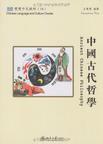中国古代哲学
2009-1
北京大学出版社
王双双
81
鲍维江和鲍凯文姐弟俩是美国生美国长的孩子,也是我的学生。工998年冬,他们送给我的新年贺卡上的小诗,深深地打动了我的心。我把这首诗看成我文化教学的“回声”。我要传达给海外每位中文老师:我教给他们(学生)中国文化,他们思考了、接受了、响应了。这条路走通了! 语言是交际的工具,更是一种文化和一种生活方式,所以学习中文也就离不开中华文化的学习。汉字是一种古老的象形文字,她从远古走来,带有大量的文化信息,但学起来并不容易。使学生增强兴趣、减小难度,走出苦学汉字的怪圈,走进领悟中华文化的花园,是我编写这套教材的初衷。 学生不论大小,天生都有求知的欲望,都有欣赏文化美的追求。中华文化本身是魅力十足的。把这宏大而玄妙的文化,深入浅出地,有声有色地介绍出来,让这迷人的文化如涓涓细流,一点一滴地渗入学生们的心田,使学生们逐步体味中国文化,是我编写这套教材的目的。 为此我将汉字的学习放入文化介绍的流程之中同步进行,让同学们在学中国地理的同时,学习汉字;在学中国历史的同时,学习汉字;在学中国哲学的同时,学习汉字;在学中国科普文选的同时,学习汉字…… 这样的一种中文学习,知识性强,趣味性强;老师易教,学生易学。当学生们合上书本时,他们的眼前是中国的大好河山,是中国五千年的历史和妙不可言的哲学思维,是奔腾的现代中国…… 总之。他们了解了中华文化,就会探索这片土地,热爱这片土地,就会与中国结下情缘。
《双双中文教材》是一套专门为海外学生编写的中文教材。它是由美国加州王双双老师和中国专家学者共同努力,在海外多年的实践中编写出来的。全书共20册,识字量2500个,包括了从识字、拼音、句型、短文的学习,到初步的较系统的中国文化的学习。教材大体介绍了中国地理、历史、哲学等方面的丰富内容,突出了中国文化的魅力。课本知识面广,趣味性强,深入浅出,易教易学。 这套教材体系完整、构架灵活、使用面广。学生可以从零起点开始,一直学完全部课程20册;也可以将后11册(10~20册)的九个文化专题和第五册(汉语拼音)单独使用,这样便于开设中国哲学、地理、历史等专门课程以及假期班、短期中国文化班、拼音速成班的高中和大学使用,符合了美国AP中文课程的目标和基本要求。 这本《中国古代哲学》是《双双中文教材》的第十八册,由王双双在陈战国先生(北京社会科学院哲学所所长)的指导和帮助下,经过多年的努力,在海外中文教学实践的基础上编写而成。全书以简单的语言,将中国先秦哲学伦理思想作概括介绍。通过对本书的学习,学生将会基本了解中国古代儒、道两家的思想,不仅能提高中文水平,也能提高思辨能力,从而可以在思想的层面上领略中华文化的精妙之处。
第一课 孔子的思想第二课 孟子的思想第三课 荀子的思想第四课 墨子的思想第五课 老子的思想第六课 庄子的思想第七课 孙子的思想第八课 《易经》的思想生字表生词表
Mo Zi (about 475 B.C.——396 B.C.) was an important Chinese thinker and philosopher. He founded a new philosophy called Mohism. Mo Zi, along with the majority of his students, were handicraftsmen and often discussed the issue of labor. They placed great emphasis on labor and the result of labor. In Mo Zis opinion, man is different from other animals. Other animals have fur and feathers as clothes, claws, and paws as shoes, grass and water as food and drinks, and can thus survive without labor. But man is different. Only by working can he be clothed and fed, and it is only through labor that he can survive. Therefore, it is a must that everyone works. Is it right for a person to steal fruits from another s orchard? Of course it is wrong, because in doing so, he has tried to possess the fruit of other people s labor without doing any work himself. Man can only enjoy the result of labor by doing the work himself. It is immoral to gain without pain. Mo Zis main thoughts are discussed below. Firstly, Mo Zi believed in "universal love." This means that people should love each other. Like Confucius and Mencius, Mo Zi believed that the greatest virtue one can have is to love others, but his idea differed from the "partiality of love" put forth by Confucius and Mencius. Confucius and Mencius held the belief that people love their own parents first, then the parents of others; that they love their own immediate family members before loving others family members. They believed that people love their parents and their family members more than others parents and relatives. This is known as the "partiality of love." But Mo Zi argued that there should be no partiality in loving people. People should love other nations as much as their own nation; they should love others parents as much as their own parents; they should love others as themselves. Mo Zi believed that love has to start with oneself. People should love others first before they can receive love from others; people should love the parents of others, then others will love their parents; people should love the nations of others first before others can love their nations. If there is love between people, families, and nations, there would be no fights and wars in the world.
